
Welcome to all of the new readers of the IDNS, our daily roundup of everything you need to know about how the media is covering Israel, all in one place for easy reference, delivered directly to your inbox every morning. We are pleased to share our internal roundup with all of our readers.
Western journalists out of Syria recount their experiences. Lots of commentary on the upcoming Netanyahu-Obama summit. Hamas now blames Egypt for Gaza’s energy crisis.
Join the Israel Daily News Stream on Facebook.
Israel and the Palestinians
• Israeli Arab Sheikh Abdallah Nimr Badir takes a shot at Sheikh Kamal Khatib (deputy leader of the Israel’s Islamist Movement). Khatib criticized Israeli Arabs who take part in Israeli politics, and Memri picked up on Badir’s blunt response: Some Hypocritical Israeli Arabs Benefit from the Zionist State While Inciting Against It.
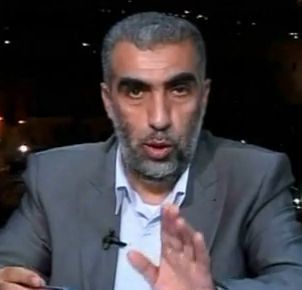
• Nice to see it’s not always Israel’s fault: Hamas blames power crisis on Egypt in rare rift
• Dore Gold: What’s with Abbas’ Temple denial?
• Writing in The Australian, Vic Alhadeff debunks the Israel apartheid accusation. Alhadeff is a former editor of South Africa’s Cape Times, so he knows what apartheid is (and ain’t).
• Columbia Spectator: Conversation, not confrontation; dialogue, not demonization.
• It’s not clear to me what the motivation was, but Israeli journalist Arthur Neslen returned to Gaza to meet the man who tried to kill him in 2009. Published in The Guardian:
Iranian Atomic Urgency
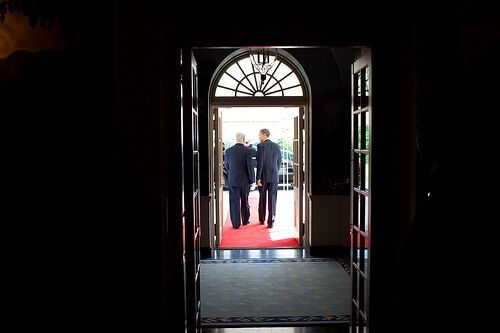
• President Obama discussed Israel and Iran with Jeffrey Goldberg. Obama says he’s covering Israel’s back, but the most interesting point is that the president doesn’t subscribe to the idea of “containing” a nuclear-armed Iran, nor does he see North Korea as a model for handling the mullahs:
GOLDBERG: Let me flip this entirely around and ask: Why is containment not your policy? In the sense that we contained the Soviet Union, North Korea —
PRESIDENT OBAMA: It’s for the reason I described — because you’re talking about the most volatile region in the world. It will not be tolerable to a number of states in that region for Iran to have a nuclear weapon and them not to have a nuclear weapon. Iran is known to sponsor terrorist organizations, so the threat of proliferation becomes that much more severe.
The only analogous situation is North Korea. We have applied a lot of pressure on North Korea as well and, in fact, today found them willing to suspend some of their nuclear activities and missile testing and come back to the table. But North Korea is even more isolated, and certainly less capable of shaping the environment [around it] than Iran is. And so the dangers of an Iran getting nuclear weapons that then leads to a free-for-all in the Middle East is something that I think would be very dangerous for the world.
Michael Ramirez has his own take on the upcoming Bibi-Bam summit:
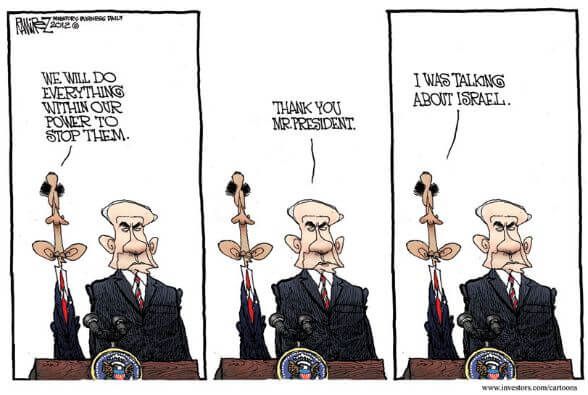
But so does Dave Granlund:

• For further commentary/analysis on the upcoming summit, take your pick of David Horovitz, a tag team WashPost op-ed by Robert Malley and Aaron David Miller, Israeli journalists Aluf Benn (in Haaretz and the Christian Science Monitor) and Ronen Bergman, and a Christian Science Monitor staff-ed.
More broken reeds and spilt ink from Prof. Colin H. Kahl (WashPost), Time‘s Tony Karon, a New York Times analysis, Canadian columnists Tony Burman, Haroon Siddiqui and Jeffrey Simpson, as well as Emanuele Ottolenghi.
• LOL: Jon Stewart (via IsraellyCool) reax to Iranian trash talk about defeating Israel at the Oscars.
Arab Spring Winter
• CNN and the Sunday Times (paywall) describes an Assad militia’s “execution spree” and other horrors:
Dozens of civilians have been shot or stabbed by Syrian forces since they moved into the besieged Baba Amr district of Homs last Thursday, opposition activists said yesterday. They described an “unprecedented” level of violence, including decapitations.
Reports yesterday suggested that children had been killed, males over 11 had been detained in mass arrests and a lorry-load of bodies had been sent out of the city.
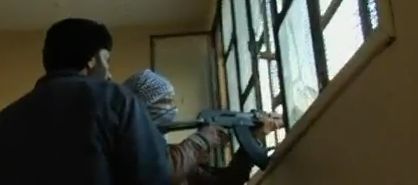
• “Kamal,” A man billed as a “key figure” in the Free Syrian Army meets with Israel HaYom. The Syrian resistance’s expectations are going to crash if this is what they’re banking on:
“I believe Assad is still in power because Western powers are not convinced that Israel really wants to see a Syria without Assad. You are afraid of what will be the day after Assad falls. Don’t be afraid. Let him go, cut him loose.”
Meanwhile, another Syrian rebel has made direct contact with Israel: by posting a comment on IDF spokesman Yoav Mordechai’s Facebook page. YNet explains:
A Syrian citizen named Abdul Khader wrote the following on Mordechai’s Facebook wall: “We want to get rid of Assad and his regime and modernize Syria by promoting freedom of religion and freedom of thought. We do not want war with you and are definitely not interested in the Golan Heights.”
An Arabic speaker, Mordechai replied: “I thank you for your words. We all wish for peace in our region and the fulfillment of our hopes for security, peace and co-existence.”
• Here’s a very clever video. Is the Syrian first lady deploring civilian deaths in Gaza or Homs?
The Lede explains what you’re watching:
A video blogger has remixed footage of an interview Asma al-Assad gave to CNN in 2009, in which Syria’s British-born first lady decried the Israeli bombardment of Gaza, to make it seem as if she was speaking out against the violent crackdown on dissent currently under way in Syria.
The remix posted on YouTube cuts together outraged comments from Mrs. Assad in 2009 (including, “the barbaric assault on innocent civilians has been horrific,” and, “this is the 21st century, where in the world could this happen?”) and video shot last week of the Syrian government’s bombardment of Homs, the city her family is originally from. (Readers should be aware that the clip includes some extremely graphic video of a dead child with a gaping head wound.)
• Edith Bouvier and William Daniels, two French journalists injured in the Shelling of Homs, made it out of Syria. Details on their escape at The Lede and LA Times. AFP reports that the bodies of Marie Colvin and Remi Ochlik were handed over to international diplomats in Syria. Bouvier and Paul Conroy shared their stories.
NY Times photographer Tyler Hicks recounts his experience in Syria — including bringing the body of colleague Anthony Shadid out of the country.
I urged the driver to hurry and we finally arrived in a small town at what looked like a medical clinic. I rushed inside and found a doctor. He checked Anthony’s vital signs and confirmed that he was dead. He said he was sorry.
The doctor spoke to me in English. “I’ve taken a huge risk helping you already,” he told me.

• The Guardian takes note of the growing prominence of Avaaz — a NYC-based NGO — and its role in helping the Syrian protest movement and assisting in the evacuation of the Western journos.
• Ruminating on the war coverage of today and yesteryear, Robert Fisk ends on this snide note:
But here’s a thought: when the Israelis unleashed their cruel bombardment of Gaza in 2008, they banned all reporters from the war, just as the Syrians tried to do in Homs. And the Israelis were much more successful in preventing us Westerners from seeing the subsequent bloodbath. Hamas forces and the “Free Syria Army” in Homs actually have a lot in common – both were increasingly Islamist, both faced infinitely superior firepower, both lost the battle – but it was left to Palestinian reporters to cover their own people’s suffering. They did a fine job. Funny, though, that the newsrooms of London and Washington didn’t have quite the same enthusiasm to get their folk into Gaza as they did to get them into Homs. Just a thought. A very unhappy one.
• The Washington Post looks at Iran’s fingerprints in Syrian suppression. But if you watch Syrian TV, the only international intervention you’ll hear about is a display of foreign currency — including Israeli shekels — seized from rebels. But there’s a problem with this “proof,” which The Lede explains:
A closer examination of the money, however, reveals that all of the the bills are notes of very small denomination withdrawn from circulation years ago in Lebanon, Turkey, Israel and the Philippines.
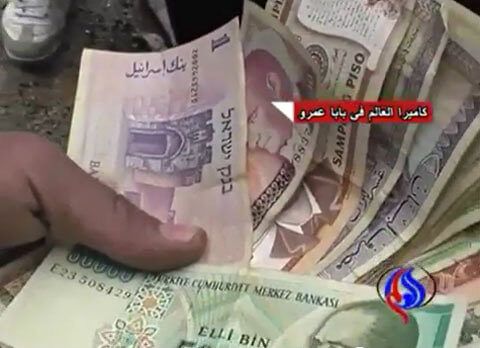
Rest O’ the Roundup
• Ryan Chittum of the Columbia Journalism Review heaps scorn on the checkbook journalism practiced by Rupert Murdoch’s papers.
Once money enters the reporting equation, it has the potential to corrupt the whole journalist/source relationship. Why would you talk to a reporter for free if you can get 500 quid, say, from another one?
(Image of Khatib via YouTube/nabilkazmouz, White House via Flickr/The White House, Homs via YouTube/RussiaToday)
For more, see Thursday’s Israel Daily News Stream.
Clicking “Unsubscribe instantly” on your mailing will remove you from the Israel Daily News Stream list, but not from your regular HonestReporting emails.

